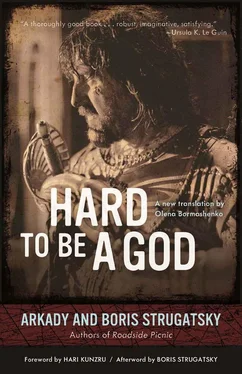Don Rumata lost a gold piece to the lieutenant and talked to him about the new uniform sword slings and methods of sword-sharpening. Rumata mentioned in passing that he was planning to pay a visit to Don Satarina, who owned some antique grinding stones, and expressed deep disappointment upon hearing that the venerable noble had lost the last of his marbles: a month ago, he released all his prisoners, let go of his entire militia, and donated his considerable arsenal of implements of torture to the treasury. The 102-year-old man had declared that he intended to devote the rest of his life to good works, and now probably wouldn’t last long.
After saying good-bye to the lieutenant, Rumata left the palace and headed to the port. He walked along, skirting puddles and jumping over potholes full of scummy water, unceremoniously elbowing gawking commoners aside, winking at girls, who were apparently irresistibly struck by his appearance, bowing to ladies carried in chairs, exchanging friendly greetings with familiar noblemen, and pointedly ignoring the gray storm troopers.
He made a small detour by the Patriotic School. This school had been established two years ago through the efforts of Don Reba, for the purpose of preparing young oafs from the inferior gentry and merchant classes to become military and administrative personnel. It was a stone building of modern construction, without any columns or bas-reliefs, with thick walls, narrow windows that resembled embrasures, and semicircular towers flanking the main entrance. If necessary, the building could withstand an attack.
Rumata went up the narrow stairs to the second floor and, jingling his spurs on the stone, walked past the classes toward the office of the school procurator. Droning voices and choruses of shouts came from the classrooms. “Who is the king? His August Majesty. Who are the ministers? Faithful servants, knowing no doubts…” “… and God, our creator, said ‘I shall curse you,’ and curse them he did…” “… and if the horn sounds twice, scatter into pairs in chain formation, lowering your pikes at the same time…” “When the tortured faints, do not get carried away—the torture must cease…”
This is school, thought Rumata. The source of all wisdom. The pillar of the culture.
He pushed open the low, vaulted door without knocking and entered the office, which was dark and ice-cold, like a cellar. A tall man rushed out to greet him from behind a giant desk piled high with papers and canes for punishment—he was bald, with sunken eyes, dressed in a tight-fitting, narrow gray uniform with the insignia of the Ministry of the Defense of the Crown. This was the procurator of the Patriotic School, the highly learned Father Kin—a sadist and murderer who had become a monk, the author of A Treatise on Denunciation, which had attracted the attention of Don Reba.
Answering the flowery greeting with a curt nod, Rumata sat down in a chair and crossed his legs. Father Kin remained standing, bent in an attitude of deferential attention. “Well, how’s it going?” Rumata asked affably. “Slaughtering some literates, educating others?”
Father Kin showed his teeth in a grin. “A literate is not the enemy of the king,” he said. “The enemy of the king is the literate dreamer, the literate skeptic, the literate nonbeliever! Whereas here we—”
“All right, all right,” said Rumata. “I believe you. What have you been scribbling? I read your treatise—a useful book, but a stupid one. How did that happen? Shame on you. Some procurator!”
“I do not endeavor to impress with my mind,” Father Kin answered with dignity. “All I have sought is to be of service to the state. We do not need smart people. We need loyal people. And we—”
“All right, all right,” Rumata said again. “I believe you. So are you writing anything new or not?”
“I’m planning to submit an essay to the ministry about a new state, modeled on the Region of the Holy Order.”
“What’s this?” Rumata said in surprise. “You want us all to become monks?”
Father Kin clasped his hands and leaned forward. “Allow me to explain, noble don,” he said fervently, licking his lips. “It’s not about that at all! It’s about the basic tenets of the new state. The tenets are simple, and there are only three of them: blind faith in the infallibility of the laws, unquestioning obedience to these laws, and also everyone vigilantly watching everyone else.”
“Hmm,” said Rumata. “But why?”
“What do you mean, why?”
“You really are stupid,” Rumata said. “All right, I believe you. Where was I? Oh yes! Tomorrow you will get two new instructors. Their names are Father Tarra, a very venerable old man who works in, what’s it called… cosmography, and Brother Nanin, also a trustworthy man, who is knowledgeable about history. These are my people, so treat them with respect. Here’s money for the pledge.” He threw a clinking pouch onto the desk. “Your share is five gold pieces. Understood?”
“Yes, noble don,” Father Kin said.
Rumata yawned and looked around. “Well, I’m glad you understood,” he said. “For some reason, my father was very fond of these people and left me instructions to set them up in life. You’re a learned man—can you explain to me why a noble don would have such affection for a literate?”
“Maybe some special services?” proposed Father Kin.
“What are you talking about?” Rumata asked suspiciously. “On the other hand, why not? Yes… a pretty daughter or sister… You have no wine here, of course?”
Father Kin spread his hands apologetically.
Rumata picked up one of the papers off the desk and held it in front of his eyes for some time. “‘Refacilitation…’” he read out loud. “What wisdom!” He dropped the page onto the floor and got up. “Make sure that your pack of scholars doesn’t bother them. I’ll pay a visit sometime, and if I find out…” He put his fist underneath Father Kin’s nose. “All right, all right, don’t be scared, I won’t do anything.”
Father Kin giggled deferentially. Rumata nodded to him and headed for the door, scraping the floor with his spurs.
On the Street of Overwhelming Gratitude he went into a weapons shop, bought new scabbard rings, tried out a couple of daggers (threw them at the wall, weighed them in his hand—didn’t like them), then sat down on the counter and had a conversation with Father Hauk, the owner. Father Hauk had sad, gentle eyes and small, pale hands stained with ink. Rumata debated with him a little about the merits of the poems of Zuren, listened to an interesting commentary on the line “As a wilted leaf falls on my soul…” and asked him to read him something new. Then, as he was leaving, having sighed with the author over the inexpressibly sad verses, he recited “To be or not to be?” in his translation into Irukanian.
“Holy Míca!” cried the inflamed Father Hauk. “Whose poetry is this?”
“Mine,” said Rumata, and left.
He went into the Gray Joy, drank a glass of sour Arkanarian brew, patted the hostess’s cheek, and deftly used one of his swords to flip the table of the usual informer, who was gawking at him with empty eyes. Then he walked over to a far corner and tracked down a shabby bearded man with an inkwell around his neck. “Hello, Brother Nanin,” he said. “How many petitions have you written today?”
Brother Nanin smiled shyly, showing small, decayed teeth. “There aren’t many petitions written nowadays, noble don,” he said. “Some people think that asking is pointless, while others expect that in the near future they’ll be able to take without asking.”
Rumata leaned down to his ear and explained that he’d arranged things with the Patriotic School. “Here are two gold pieces,” he concluded. “Buy some clothes, get yourself in order. And try to be more careful—at least for the first couple of days. Father Kin is a dangerous man.”
Читать дальше












